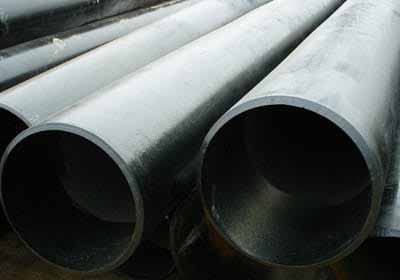Boilers are integral components in various industrial processes, from heating systems in buildings to large-scale industrial operations. To ensure optimal performance and longevity, choosing the right materials for a boiler’s construction and operation is essential. Among the most popular materials used for boilers is stainless steel. Stainless steel provides strength, corrosion resistance, and durability, making it the ideal material choice for boiler applications that face high temperatures and pressures.
Key Advantages of Stainless Steel Pipes for Boilers
In this blog, we will explore why stainless steel pipes are a preferred option for boilers, with a particular focus on Stainless Steel 321 Pipes, and discuss their key benefits in enhancing boiler performance and ensuring longevity.
Boiler systems commonly use stainless steel pipes. They offer exceptional strength, resistance to corrosion, and the ability to withstand high temperatures. Boilers operate under harsh conditions, involving high pressures and extreme temperatures, which can accelerate wear and tear on materials. Therefore, the material used for piping in boilers must meet rigorous performance criteria to ensure efficiency, reliability, and safety.
The primary function of pipes in a boiler system is to carry steam, water, or other fluids that are heated or processed within the boiler. These pipes need to withstand the pressures and temperatures generated inside the boiler while preventing leakage and degradation over time.
-
High-Temperature Resistance
Boiler systems operate at elevated temperatures, and materials used in these systems must possess excellent high-temperature resistance. Stainless steel pipes, especially Stainless Steel 321 Pipes, are known for their outstanding ability to maintain strength and structural integrity at high temperatures.
Stainless Steel 321 Pipes are specifically designed for high-temperature environments. The addition of titanium in this grade helps stabilize the material, preventing the formation of carbide precipitates at high temperatures. This makes it an ideal choice for boiler systems, where pipes are exposed to continuous heat. The ability of stainless steel pipes to resist thermal expansion and contraction also ensures that the system operates efficiently without the risk of cracking or failure.
-
Corrosion Resistance
Corrosion is one of the biggest challenges in boiler systems, especially in environments where water or steam may come into contact with the pipes for prolonged periods. Stainless steel, by nature, is highly resistant to corrosion, making it ideal for use in boilers. Stainless Steel 321 Pipes, in particular, offer enhanced resistance to corrosion due to their chromium content, which forms a protective layer that prevents rust and corrosion.
In addition to its resistance to general corrosion, Stainless Steel 321 Pipes provide superior protection against intergranular corrosion. This is particularly beneficial in high-temperature applications, such as those found in boilers, where other materials might degrade more rapidly.
-
Durability and Longevity
Boilers endure high operational stresses over long periods, making it crucial to use materials that offer durability and a long lifespan. Stainless steel pipes resist wear and tear, reducing the need for frequent maintenance or replacement. Stainless Steel 321 Pipes offer particularly high durability, thanks to their resistance to oxidation and their ability to withstand harsh operating conditions.
The durability of stainless steel pipes ensures that boilers continue to function effectively and efficiently without the risk of pipe failure, which can lead to costly downtimes and repairs. The resistance to scaling and buildup of mineral deposits also contributes to the extended lifespan of the pipes.
-
High Strength and Pressure Resistance
The performance of boiler systems depends heavily on the ability of the pipes to withstand high pressures. Stainless steel, particularly Stainless Steel 321 Pipes, offers superior strength and pressure resistance, making it the material of choice for carrying steam or water in high-pressure environments.
The structural integrity of stainless steel pipes ensures that they can withstand the internal pressure without compromising their safety or function. In boiler systems, where pressure and temperature can fluctuate, stainless steel pipes can absorb these stresses and prevent damage to the system. This makes them an ideal choice for applications that require both high temperature and high pressure.
-
Flexibility in Design and Installation
Stainless steel pipes, including Stainless Steel 321 Pipes, are easy to fabricate and install, providing greater flexibility in boiler system design. Whether a system requires custom fittings or needs to navigate complex layouts, you can easily cut, weld, and shape stainless steel to meet specific requirements.
The ease of installation reduces the overall time and labor costs associated with setting up a boiler system. Additionally, stainless steel pipes have a smooth internal surface, which minimizes friction and prevents the accumulation of debris and buildup that can impair the efficiency of the system.
-
Resistance to Thermal Cycling
Thermal cycling, or the repeated expansion and contraction of materials due to fluctuating temperatures, is common in boiler systems. Materials that cannot withstand thermal cycling may crack, weaken, or fail under pressure, causing significant disruptions to the system’s performance.
Stainless Steel 321 Pipes offer excellent resistance to thermal cycling. The titanium content in this alloy forms stable titanium carbides, which prevent the material from becoming brittle and ensure it maintains its strength and flexibility, even during repeated temperature fluctuations. This makes Stainless Steel 321 Pipes a preferred choice for boiler systems, where constant temperature shifts are a regular occurrence.
Applications of Stainless Steel Pipes in Boiler Systems
Stainless steel pipes, particularly Stainless Steel 321 Pipes, are widely used in various components of boiler systems, including:
- Steam Drums: Stainless steel pipes are used to connect and carry steam from the boiler drum to other parts of the system. Their high-temperature resistance ensures that steam is transported efficiently without the risk of material failure.
- Superheaters: These components raise the temperature of steam beyond its boiling point. Superheaters use stainless steel pipes because they can withstand the extreme heat generated during the process.
- Economizers: Stainless steel pipes are used to collect heat from exhaust gases, improving the overall efficiency of the boiler system. Their resistance to corrosion and thermal cycling makes them perfect for this application.
- Feedwater Systems: Stainless steel pipes are used to transport water into the boiler. Their durability and resistance to corrosion make them ideal for use in feedwater systems. In these systems, the pipes are in constant contact with water.
- Heat Exchangers: Stainless steel pipes are often used in heat exchangers within boiler systems to transfer heat between fluids. Their ability to handle high pressure and temperature ensures efficient heat transfer.
Conclusion
Choosing the right material for a boiler system is critical to ensuring long-term performance, reliability, and safety. Stainless Steel 321 Pipes are a top choice for boiler systems due to their excellent high-temperature resistance, corrosion resistance, strength, and durability. These pipes withstand the harsh conditions in boiler systems, including high pressures and fluctuating temperatures. They also resist corrosive environments, ensuring the boiler operates efficiently and safely over time.
Incorporating stainless steel pipes, especially Stainless Steel 321 Pipes, into your boiler system will not only improve its performance but also reduce maintenance costs, increase the lifespan of the system, and provide enhanced safety. As the demand for energy-efficient and durable heating systems grows, stainless steel remains the go-to material. It ensures the continued success of boiler operations across industries.






